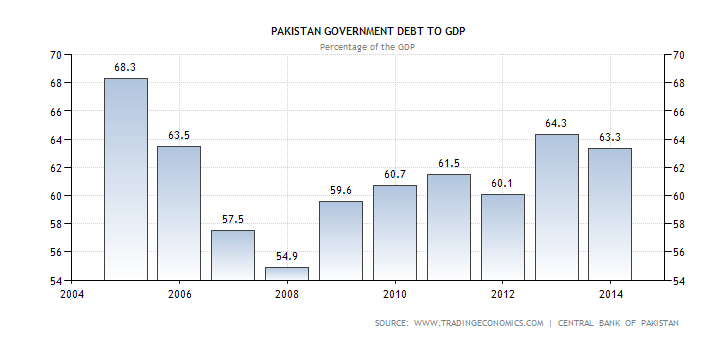
In a moving reflection on the tragedy presently unfolding in Islamabad, Farrukh Khan Pitafi noted that, “The first casualty in all this is reason”. Sadly, Pitafi sahib may be eulogising something lost well before Imran Khan and Tahirul Qadri mobilised their goondas supporters. Last week, a new extensive survey of Pakistani attitudes was released that includes some startling revelations about how we perceive reality, and just how disconnected we have become from the same.
The survey, which was published with the heading, ‘A less gloomy mood in Pakistan‘ was overlooked by many amid the political chaos. Some of the results are so predictable that they’re hardly worth mentioning. Army continues to receive the highest marks at 87%, up 8 points from the already high 79% they received a year ago.
What are more noteworthy, however, are the public’s attitudes towards society’s ills and their solutions. Those who believe the economy is in good shape have more than doubled from 17% to 37%. This is particularly interesting since the interviews were conducted during a time when IMF was lowering economic growth projections for Pakistan. In fact, when people were asked about issues that had been identified as major problems only a year earlier, they were less likely to say these were still problems. For example, in 2013, 82% said public debt was a very big problem. In 2014, only 58% still thought so – a decline of 24%! Again, let us compare perception to facts. Actual debt to GDP only declined by 1%, and is still higher than it was from 2008 to 2012.

Is public debt simply more acceptable under Nawaz Sharif than under Asif Zardari? The disconnect between perception and reality is hard to explain. If beliefs about the economy are hard to understand, though, our beliefs about national security are even more inexplicable.
According to this poll, jihadi militants responsible for killing over 50,000 innocent Pakistanis are not our national security threat. India is.
When asked to rate the greatest threat facing their country – the Taliban, al Qaeda, or India – Pakistanis tend to cite their neighbor to the east: 51% believe India is the biggest threat, up from 38% in 2013. One-in-four name the Taliban and only 2% say al Qaeda.
Twice as many people believe India is a greater threat than the people actually killing us. Again, bear in mind that this survey was conducted two months before Zarb-e-Azb began, so it cannot be explained away by the public relations campaign that has accompanied Army’s anti-Taliban operations in North Waziristan.
Yes, you say, but anti-India sentiments are embedded in our psyche from such early age that they are bound to influence our perceptions. So let us examine a third and equally as serious issue that plagues our country: Sectarianism.
According to the survey, sectarian tensions are no longer as serious a problem as they once were. Not just less serious, but 20% less! According to the survey, in early 2013, 59% people said sectarian tensions were ‘a very big problem’. This year, only 39% – a drop of 20%. Meanwhile, in the real world over the past year, sectarian violence rose to record levels.
Sectarian-related terrorist attacks in 2013
| Province | Number of Killed | Injured | Attacks |
| Balochistan | 33 | 278 | 499 |
| Sindh | 132 | 215 | 319 |
| Punjab | 17 | 32 | 29 |
| KP/FATA | 26 | 133 | 348 |
| Total | 208 | 658 | 1,195 |
In the field of psychology, ‘psychosis’ is a generic term used to describe a loss of contact with reality. Usually, this term refers to an individual. But what do we say when an entire nation loses contact with reality? And, more importantly, how do we begin to heal?
![]()





